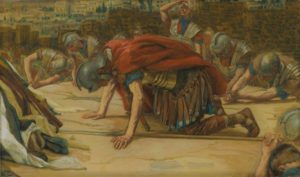
Forgiving the Unforgivable
While studying and living in New Jersey for seminary, I was only a train ride away from New York City. I am not particularly drawn to large cities like New York, but I was fortunate enough to visit the brand-new, at the time, World Trade Center memorial. While reflecting on our lectionary readings for this Sunday, which all center around the profound forgiveness of God towards the most notorious of sinners, I realized that the 19th anniversary of the September 11th attacks would take place today.
 Tribute in Light, 9/11 Memorial
Tribute in Light, 9/11 Memorial
The Confession of the Centurion – James Tissot, c. 1890.
Brooklyn Museum. Public Domain.
I recall seeing a startling artifact in the World Trade Center memorial that presents a perfect image of God’s forgiveness on full display in the midst of a horrible atrocity. Behind a glass case in the museum lies a piece of rubble with a passage from the Gospel of Matthew fused onto it. Somehow, in the chaos of the towers falling, an open Bible had attached itself to a twisted, distorted piece of hot metal, permanently fusing God’s word to an artifact of terror. The page fused onto this piece of wreckage is from St. Matthew’s Gospel: “Ye have heard that it hath been said, An eye for an eye, and a tooth for a tooth: But I say unto you, That ye resist not evil: but whosoever shall smite thee on thy right cheek, turn to him the other also.” (The image is available here.)
This is not our lectionary reading for Sunday (how poetic that would be), but it speaks to the same truth: in Christ Jesus God has given us another way. Another way to respond to the inevitable wickedness, violence, and evil that plagues us: the way of forgiveness most clearly displayed in Christ Jesus, God’s Word nailed to an instrument of torture; who fully displayed the futility and weaknesses of those powers that tried to destroy him. This other way stands as the only effective barrier to the rampant cycles of violence that humanity continually falls victim to, and it is a way that sometimes shocks and offends even those who cling to God’s mercy themselves. Consider that it was the Roman Centurion, who without question played an active role in the crucifixion of our Lord, that exclaims, “surely, this man was the Son of God,” in Mark’s Gospel. Consider that it was the Apostle Paul, himself a terrorist and murderer of Christians, who became the messenger of the Gospel of Grace to the Gentiles.
Forgiveness reminds us that we are all in God’s hands. Clearly, it was not Paul who chose his life-altering shift away from murder and terror to grace and love. Forgiveness reminds us that God does not play human games or appreciate human distinctions. America, Afghanistan, Canada, Mexico; these distinctions mean nothing to God, who creates and redeems all of us. After we are all long dead and gone, none of us should be surprised to hear Church historians discuss a great revival movement that began with a penitent member of Al-Qaeda or Isis who encountered Christ in a disruptive act of grace and mercy. Forgiveness reminds us of the profound equality we all share before God. Equally in need of God’s forgiveness, equally forgiven.
O God, the Creator of all, whose Son commanded us to love our enemies: Lead them and us from prejudice to truth; deliver them and us from hatred, cruelty, and revenge; and in your good time enable us all to stand reconciled before you in Jesus Christ; in whose Name we pray. Amen.
Fr. Matt

